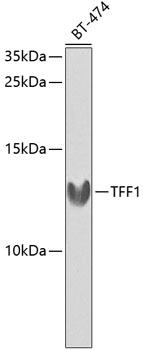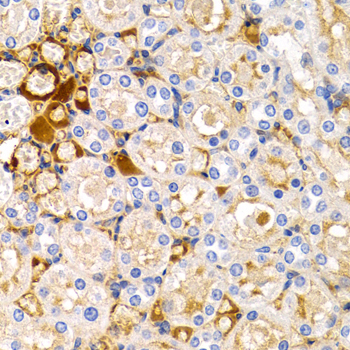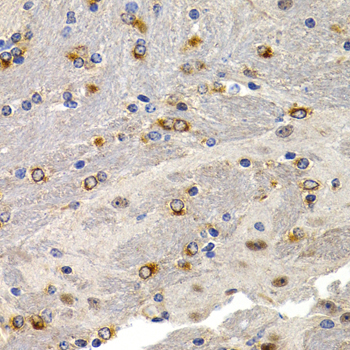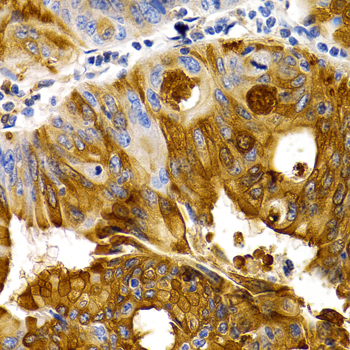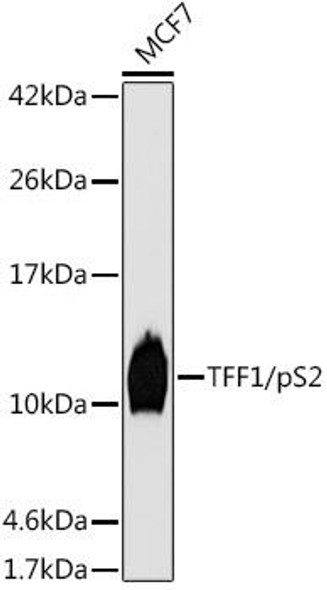Cell Biology Antibodies 7
Anti-TFF1 Antibody (CAB1789)
- SKU:
- CAB1789
- Product Type:
- Antibody
- Reactivity:
- Human
- Reactivity:
- Mouse
- Reactivity:
- Rat
- Host Species:
- Rabbit
- Isotype:
- IgG
- Antibody Type:
- Polyclonal Antibody
- Research Area:
- Cell Biology
Description
| Antibody Name: | Anti-TFF1 Antibody |
| Antibody SKU: | CAB1789 |
| Antibody Size: | 20uL, 50uL, 100uL |
| Application: | WB IHC |
| Reactivity: | Human, Mouse, Rat |
| Host Species: | Rabbit |
| Immunogen: | Recombinant fusion protein containing a sequence corresponding to amino acids 25-84 of human TFF1 (NP_003216.1). |
| Application: | WB IHC |
| Recommended Dilution: | WB 1:500 - 1:1000 IHC 1:50 - 1:200 |
| Reactivity: | Human, Mouse, Rat |
| Positive Samples: | BT-474 |
| Immunogen: | Recombinant fusion protein containing a sequence corresponding to amino acids 25-84 of human TFF1 (NP_003216.1). |
| Purification Method: | Affinity purification |
| Storage Buffer: | Store at -20'C. Avoid freeze / thaw cycles. Buffer: PBS with 0.02% sodium azide, 50% glycerol, pH7.3. |
| Isotype: | IgG |
| Sequence: | EAQT ETCT VAPR ERQN CGFP GVTP SQCA NKGC CFDD TVRG VPWC FYPN TIDV PPEE ECEF |
| Gene ID: | 7031 |
| Uniprot: | P04155 |
| Cellular Location: | Secreted |
| Calculated MW: | 9kDa |
| Observed MW: | 12kDa |
| Synonyms: | TFF1, BCEI, D21S21, HP1.A, HPS2, pNR-2, pS2 |
| Background: | Members of the trefoil family are characterized by having at least one copy of the trefoil motif, a 40-amino acid domain that contains three conserved disulfides. They are stable secretory proteins expressed in gastrointestinal mucosa. Their functions are not defined, but they may protect the mucosa from insults, stabilize the mucus layer, and affect healing of the epithelium. This gene, which is expressed in the gastric mucosa, has also been studied because of its expression in human tumors. This gene and two other related trefoil family member genes are found in a cluster on chromosome 21. |
| UniProt Protein Function: | TFF1: Stabilizer of the mucous gel overlying the gastrointestinal mucosa that provides a physical barrier against various noxious agents. May inhibit the growth of calcium oxalate crystals in urine. |
| UniProt Protein Details: | Protein type:Secreted, signal peptide; Secreted Chromosomal Location of Human Ortholog: 21q22.3 Molecular Function:protein binding Biological Process: carbohydrate metabolic process |
| NCBI Summary: | Members of the trefoil family are characterized by having at least one copy of the trefoil motif, a 40-amino acid domain that contains three conserved disulfides. They are stable secretory proteins expressed in gastrointestinal mucosa. Their functions are not defined, but they may protect the mucosa from insults, stabilize the mucus layer, and affect healing of the epithelium. This gene, which is expressed in the gastric mucosa, has also been studied because of its expression in human tumors. This gene and two other related trefoil family member genes are found in a cluster on chromosome 21. [provided by RefSeq, Jul 2008] |
| UniProt Code: | P04155 |
| NCBI GenInfo Identifier: | 131127 |
| NCBI Gene ID: | 7031 |
| NCBI Accession: | P04155.1 |
| UniProt Related Accession: | P04155 |
| Molecular Weight: | 9,150 Da |
| NCBI Full Name: | Trefoil factor 1 |
| NCBI Synonym Full Names: | trefoil factor 1 |
| NCBI Official Symbol: | TFF1 |
| NCBI Official Synonym Symbols: | pS2; BCEI; HPS2; HP1.A; pNR-2; D21S21 |
| NCBI Protein Information: | trefoil factor 1 |
| UniProt Protein Name: | Trefoil factor 1 |
| UniProt Synonym Protein Names: | Breast cancer estrogen-inducible protein; PNR-2; Polypeptide P1.A; hP1.A; Protein pS2 |
| Protein Family: | Trefoil factor |
| UniProt Gene Name: | TFF1 |
| UniProt Entry Name: | TFF1_HUMAN |
View AllClose


